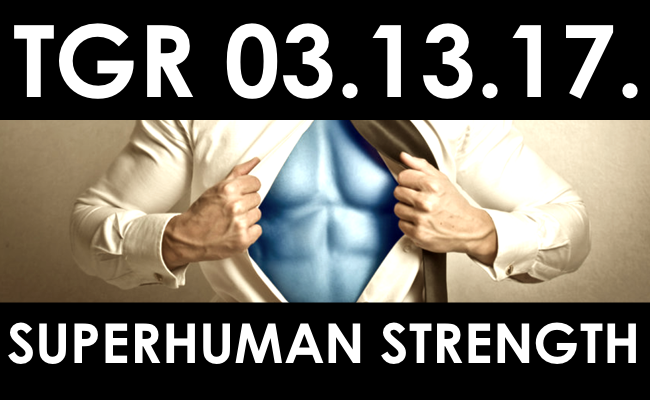This week on The Gralien Report, following a week of Wikileaks in relation to the operations of U.S. intelligence operations, we kick off this week’s show with a discussion about “fake news”, which leads us to an examination of former Blink 182 rocker Tom DeLonge’s recent UFO claims. He says that within 60 days there will be a “big announcement” about UFOs, but the bigger questions have to do with who is supplying him with information, and why?
Then in hour two, in addition to looking at the bizarre qualities many highly intelligent people possess, we focus our attention on we look at instances where average people have displayed extraordinary strength which science has not yet fully explained. Incredible feats of human strength have occurred while individuals involved were under duress, or other circumstances that created great amounts of stress. Are there various stimuli that can help the human body “override” various functions, and extend the limits of natural human strength when circumstances call for it? We explore this, and much more, on this week’s edition of The Gralien Report Podcast.
Join us and become a member of Gralien X for more great podcasts and bonus monthly specials.
Got information or comments you’d like to share with us for an upcoming edition of the program? Send Micah an email with your thoughts or other information.





I had personally written to Micah on the subject of EGO. I felt a common misunderstanding of the meaning and definition is running rampant in our culture in misuse. I believe this is due to the strange choice of words psychologists used to define ego. I felt with the release of Arrival this would be a great topic. I as a hobby study etymology the first thing I noticed about it is old definitions, a whole lot of them, mean the complete opposite today of their intended meanings. Example a skeptic in origin is a person who believes nothing can ever be known. Yet today this same word is tossed around by people claiming they know this and that a complete perversion of the original definition. The arrival asks of the audience to suspend and bend their disbelieve to the point where a species that can’t even get its own language system straight could figure out an alien one? Talk about a big ego.
Now Big ego = weak. Small ego = strong. The way people talk about ego to me doesn’t reflect a understanding of this. Why they the psychologists choose to flip big and small away from our common understanding would be beyond me except we are talking humans here. They don’t think anything through clearly enough to see the consequences they don’t see even what is right in their face. It takes a genius just to see what is there because we are products of a limited corrupt system of language being misused to propagate a false enlightenment. Anyone who has written and looked into language understands that the English language is one of the most limited and limiting systems of meanings. It is as if it was structured purposely to limit creativity, to limit thinking, to keep its speakers from understanding anything even remotely outside the reaches of its culture. A great example is a word that holds some deep thought out implications about the state of being something in the Egyptian language it is said “Kheper”. The english language has no words that say the same thing even though it means “to become” our definition of becoming hasn’t the slightest commonality of understanding with what it means to their culture. The following was taken from:
http://www.ottawa-psychologist.net/big-or-strong-the-ego-difference/
Notice how the definitions of ego spitting out from the mouth of every talk show, every tv show, every podcast host is defined as if the meaning of ego has purely negative connotations and must be dissolved. I don’t know if I’m just misunderstanding these hosts but here is the real definition of ego from psychology and you can decide and think for yourself.
“A strong ego is self-realized internally, without much concern for other’s acceptance. A strong ego is aware of personal strengths and limitations, is compassionate, open to constructive criticism, and able to give and receive love. A strong ego is flexible, responds to crises with empathic thought, and can control impulses for gratification to a later time.
A big ego instead depends on others for validation and a sense of importance, and needs frequent bolstering from external sources; it has low tolerance for criticism, and needs constant adulation and reassurance.
A strong ego is therefore better suited to intimate relationships than a big ego, which is really a weak ego.
When a person acts in an all-knowing and highly opinionated manner, even bullying in their insistence that they are right, we often refer to them as having “a big ego”. However, when you scratch the surface, this ego doesn’t go down very deep and is quickly seen as weak instead. Of course when things go well, those with a big ego remain serenely in control and appear stable. But the façade must be maintained at all times, and that is the problem.
There is a significant difference between a big ego and a strong ego – and that is what psychologists refer to as “ego strength.” A strong ego is a flexible one. It can bend with adversity and still remain strong. According to Sigmund Freud, the ego is what combines the demands of the id (our basic urges), the superego (our moral and idealistic standards), and reality. A strong ego is able to effectively balance the demands of these three components. Those whose ego is too big become unyielding and rigid and are easily stressed when things don’t go their way. Those who have a strong ego are able to maintain their feelings of self-worth throughout adversity.”